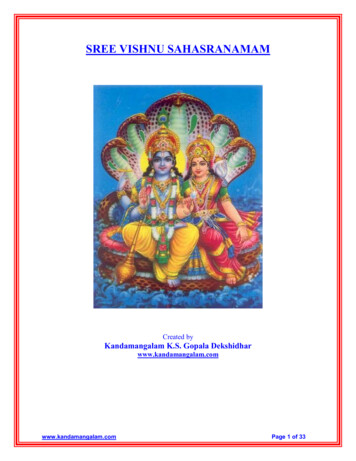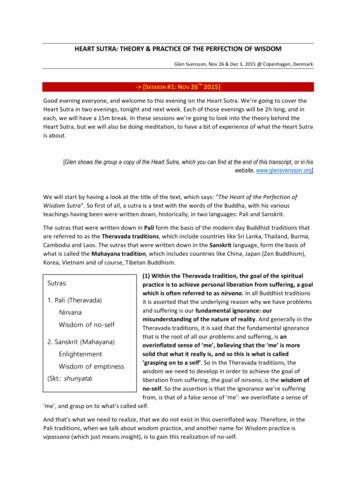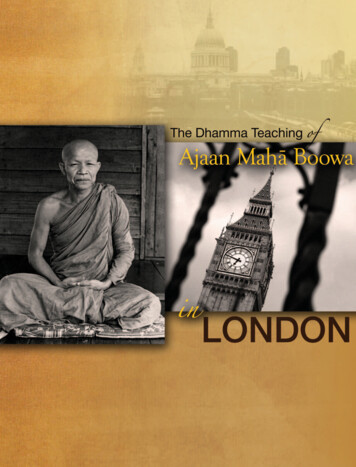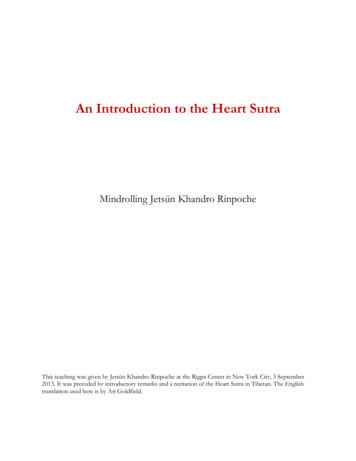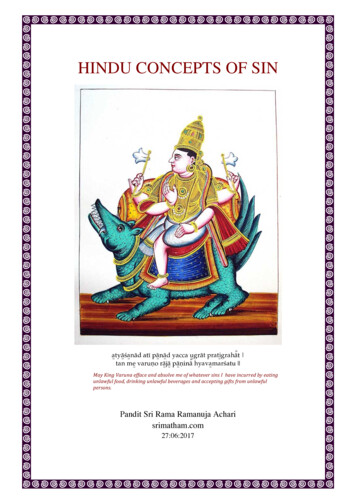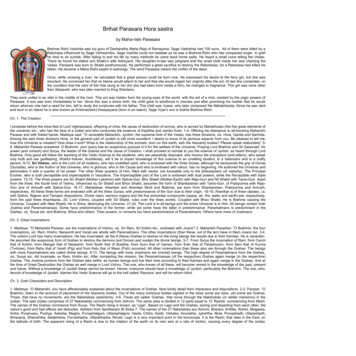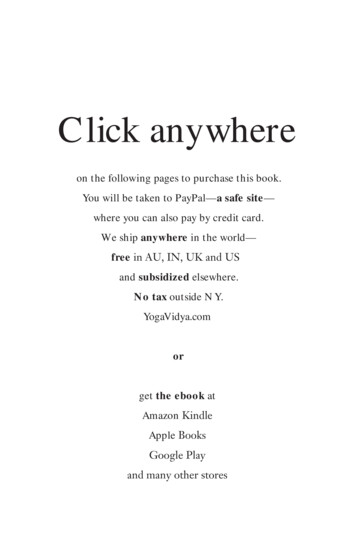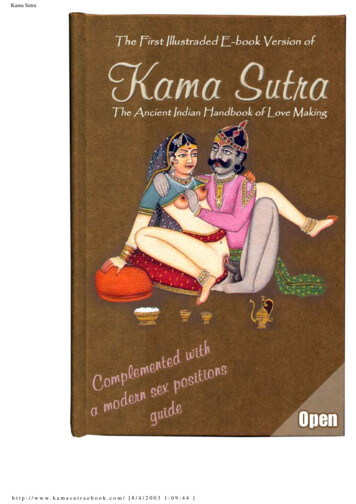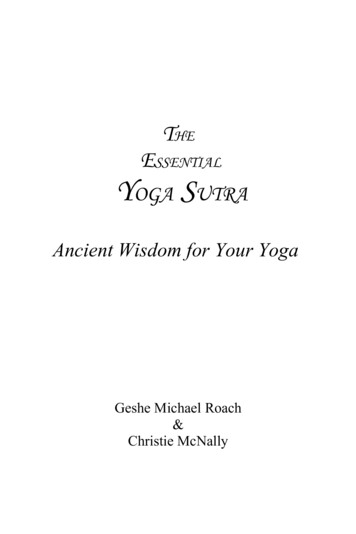Transcription
Maha-Prajna-ParamitaHridaya Sutra(The Heart Sutra)When Avalokiteshvara Bodhisattva was practicing the profound Prajna Paramita, heinvestigated and perceived the five Skandhas and saw that they were all non-existent,thus securing his deliverance from all suffering and difficulty."Shariputra, form does not differ from emptiness; emptiness does not differ from form.Form itself is emptiness; emptiness itself is form. So too are feeling, cognition, mentalfunction and consciousness in relation to emptiness.Shariputra, all dharmas are empty of characteristics. They are not created, notannihilated, not impure, not pure, and they neither increase nor decrease. Therefore, inemptiness there is no form, feeling, cognition, mental function, or consciousness; noeyes, ears, nose, tongue, body and mind; no sights, sounds, smells, taste, touch, andideas; no field of the eyes, up to and including no field of mind-consciousness1, and noignorance or ending of ignorance, up to and including no old age and death, or endingof old age and death.2 There are no Four Noble Truths, no wisdom and no gain.Because nothing is gained, the Bodhisattva, through reliance on Prajna Paramita, has nohindrances in his heart. Because there is no hindrance, he is not afraid, is free fromcontrary and delusive ideas and attain the Final Nirvana.All Buddhas of the past, present and future attain enlightenment through reliance onPrajna Paramita. Therefore, know that Prajna Paramita is a great spiritual mantra, agreat bright mantra, a supreme mantra, an unequalled mantra. It can remove allsuffering; it is genuine and not false. That is why the mantra of Prajna Paramita wasspoken. Recite it like this:GATE GATE PARAGATE PARASAMGATE BODHI SVAHA!THE HEART SUTRAWhen Avalokiteshvara Bodhisattva was practicing the profound Prajna Paramita, heilluminated the five Skandhas and saw that they were all empty, and he crossed beyondall suffering and difficulty.Shariputra, form does not differ from emptiness: emptinessdoes not differ from form. Form itself is emptiness; emptiness itself is form. So too arefeeling, cognition, mental function and consciousness.
Shariputra. all Dharmas are empty of characteristics. They are not produced, notdestroyed, not defiled, not pure, and they neither increase nor decrease. Therefore, inemptiness there is no form, feeling, cognition, mental function, or consciousness; noeyes, ears, nose, tongue, body, or mind; no sights, sounds, smells, taste, touch, ordharmas; no field of the eyes, up to and including no field of mind-consciousness: andno ignorance or ending of ignorance, up to and including no old age and death, orending of old age and death. There is no suffering, no accu no way, no wisdom and noattaining.Because nothing is attained, the Bodhisattva, through reliance on Prajna Paramita, isunimpeded in his mind. Because there is no impediment, he is not afraid, and he leavesdistorted dreamthinking far behind.Ultimately Ninana! All Buddhas of the past, present and future attain enlightenmentthrough reliance on Prajn Paramita. Therefore, know that Prajna Paramita is a greatspiritual mantra, a great bright mantra, a supreme mantra, an unequalled mantra. It canremove all suffering; it is genuine and not false. That is why the mantra of PrajnaParamita was spoken. Recite it like this:GATE GATE PARAGATE PARASAMGATE BODHI SVAHA!(Note: Tathagata Buddhas)The Heart SutraO-oh Sariputra, what is seen does not differ from what is empty,nor does what is empty differ from what is seen;what is seen is empty, what is empty is seen.It is the same for sense perception,imagination, mental function and judgement.O-oh Sariputra, all the empty forms of these dharmasneither come to be nor pass awayand are not created or annihilated,not impure or pure,and cannot be increased or decreased.Since in emptiness nothing can be seen,there is no perception, imagination, mental function or judgement.
There is no eye, ear, nose, tongue, body or consciousness.Nor are there sights, sounds, odors, tastes, objects or dharmas.There is no visu-al world, world of consciousness or other world.There is no ignorance or extinction of ignorance and so forthdown to no aging and death and also no extinction of aging anddeath.There is neither suffering, causation, annihilation nor path.There is no knowing or unknowing. Since nothing can be known,Bodhisattvas rely upon Prajna Paramita and so their minds areunhindered.Because there is no hindrance,no fear exists and they are far from inverted and illusory thoughtand thereby attain nirvana.All the Buddhas in the three per-i-ods of timefully accomplish the an-nut-ta-ra-sam-yak sambod-hiby relying upon Prajna Paramita.Therefore, Prajna Paramita is known as the most divine mantra,the great enlightening mantra,the utmost mantra,the in-com-pa-ra-ble mantra,destroyer of all suffering!since what is true is not in vain,listen to the mantra of the Prajna Paramita--it goes like this:GATE GATE PA-RA GATE PARASAM GATE BOD-HI SVA-HA!THE DIAMOND SUTRAThe Vajracchedika-prajna-paramita SutraThus have I heard. Once upon a time, the Buddha sojourned in the Jetavana park nearSravasti with an assembly of twelve hundred and fifty bhiksus.One day, at mealtime, the World Honoured One put on His robe, took His bowl, andentered the great town of Sravasti to beg for His food. After He had begged from doorto door, He returned to His place. When He had taken His meal, He put away His robeand bowl, washed His feet, arranged His seat and sat down.
At the time, the elder Subhuti who was in the assembly, rose from his seat, uncoveredhis right shoulder, knelt upon his right knee, respectfully joined the palms of his handsand said to the Buddha: 'It is very rare, O World Honoured One! how well the Tathagataprotects and thinks of all Bodhisattvas; how well He instructs all the Bodhisattvas."O World Honoured One, when virtuous men or women develop the supremeenlightenment mind, how should their minds abide and how should they be subdued?'The Buddha said: 'Excellent, excellent, Subhuti! As you say, the Tathagata protects,cherishes and instructs Bodhisattvas so well. Now listen attentively and I will tell youhow the minds of virtuous men and women, who develop the supreme enlightenmentmind, should thus abide and be subdued. (Subhuti replied: ) 'Oh yes, World HonouredOne, I shall be glad to hear (your instruction).'The Buddha said: 'Subhuti, all Bodhisattvas and Mahasattvas should subdue their mindsas follows: All living beings born from eggs, wombs, humidity or by transformation,with or without form, either thoughtful or thoughtless, and neither thoughtful northoughtless are all led by me to the final nirvana for the extinction of reincarnation.Although immeasurable, uncountable and unlimitable numbers of living beings are thusled to (the final nirvana for) the extinction of reincarnation, it is true that not a livingbeing is led there. Why so, Subhuti? (Because) if a Bodhisattva (still) clings to the falsenotion (laksana) of an ego, a personality, a being and a life, he is not ( a true)Bodhisattva. 'Furthermore, Subhuti, a Bodhisattva's mind should not abide anywherewhen giving alms; that is to say, he should give without a mind abiding in form, or heshould give without a mind abiding in sound, or in smell, or in taste, or in touch or inthings . Subhuti thus a Bodhisattva should give alms without a mind abiding in falsenotions of form (laksana).'Why? (Because) if a Bodhisattva's mind does not abide in forms .(laksanas) whenpractising charity (dana), his merit will be inconceivable and immeasurable. Subhuti,what do you think? Can you think of and measure the extent of space in the East?''I cannot, World Honoured One!''Subhuti, can you think of and measure (all) the extent of space in the South, West andNorth, as well as in the intermediate directions, including the zenith and nadir?''I cannot, World Honoured One!''Subhuti, (when) a Bodhisattva practises charity without a mind abiding in forms, hismerit is equally inconceivable and immeasurable.' 'Subhuti, a Bodhisattva's mind shouldthus abide as taught.'Subhuti, what do you think? Can the Tathagata be seen by means of His bodily form?''No, World Honoured One, the Tathagata cannot be seen by means of His bodily form.Why? Because when the Tathagata speaks of bodily form, it is not (real) form.'The Buddha said to Subhuti: 'Everything with form is unreal; if all forms are seen asunreal, the Tathagata will be perceived.'
Subhuti said to the Buddha: 'World Honoured One, will there be living beings who candevelop a true belief in these words, sentences and chapters when they are expounded tothem?'The Buddha said: 'Subhuti, do not speak like that. In the last 500 years, before the finalpassing of the Tathagata, there will be those who will observe the rules of morality andperform good actions which will result in blessing. These people will be able to developa faith in these sentences (which they will consider as embodying the Truth. You shouldknow that they will not have planted good roots in just one, two, three, four, or fiveBuddha lands. They will have planted them in countless thousands and tens ofthousands of Buddha lands. Upon hearing these sentences, there will arise in them asingle thought of pure faith. Subhuti, the Tathagata knows and sees all; these livingbeings will thus acquire immeasurable merits. Why? (Because) they will have wiped outfalse notions of an ego, a personality, a being and a life, of Dharma and Not-Dharma.Why? (Because) if their minds grasp form (laksana), they will (still) cling to the notionof an ego, a personality, a being and a life. If their minds grasp the Dharma, they will(still) cling to the notion of an ego, a personality, a being and a life. Why? (Because) iftheir minds grasp the Not-Dharma, they will (still) cling to the notion of an ego, apersonality, a being and a life. Therefore, one should not grasp and hold on to the notionof Dharma as well as that of NotDhama. This is why, the Tathagata always said: "YeBhiksus, should know that the Dharma I expound is likened to a raft." Even the Dharmashould be cast aside; how much more so the Not-Dharma?'Subhuti, what do you think? Has the Tathagata (in fact) obtained SupremeEnlightenment (Anubodhi)? Does the Tathagata (in fact) expound the Dharma?'Subhuti replied: 'As I understand the meaning of the Buddha's teaching, there is nofixed Dharma called Supreme Enlightenment and there is also no fixed Dharma theTathagata can expound. Why? (Because) the Dharma the Tathagata expounds cannot beclung to and cannot be expressed (in words); it is neither Dharma nor Not-Dharma.Why is this? All Bhadras and Aryas differ on account of the Eternal AsamskrtaDharma.''Subhuti' what do you think? If someone filled the Universe with the seven treasures andgave them all as alms, would his merit be great?'Subhuti replied: 'Very great, World Honoured One. Why? Because this merit is not thenature of merit, the Tathagata says it is great.''Subhuti, if on the other hand, someone received and kept even a four line stanza of thissutra and expounded it to others, his merit would surpass that (of the giver of treasures).Why? (Because), Subhuti, all Buddhas and their Supreme-Enlightenment-Dharmaoriginate from this sutra. Subhuti, the so-called Buddhas and Dharmas are not realBuddhas and Dharmas.'Subhuti, what do you think? Can one who has entered the stream (srota-apanna) havethis thought (in his mind): I have obtained the fruit of entering the stream?'
Subhuti replied: 'No, World Honoured One. Why? Because srota-apanna means'entering the stream', but actually there is no entry into either form, sound, smell, taste,touch or dharma. Therefore, he is called srota-apanna.''Subhuti, what do you think? Can a Sakrdagamin have this thought (in his mind): I haveobtained the fruit of a Sakrdagamin?'Subhuti replied: 'No, World Honoured One. Why? Because Sakrdagamin means „oncemore to come", but actually there is neither coming nor going. Therefore, he is called aSakrdagamin.''Subhuti, what do you think? Can an Anagamin have this thought (in his mind): I haveobtained the fruit of an Anagamin?'Subhuti replied: 'No, World Honoured One. Why? Because Anagamin means "nocoming" but actually there is no such a thing as no-coming. Therefore, he is called anAnagamin.''Subhuti, what do you think? Can an Arhat have this thought (in his mind): I haveobtained the enlightenment of an Arhat?'Subhuti replied: 'No, World Honoured One. Why? Because there is no Dharma which iscalled Arhatship. World Honoured One, if an Arhat thinks "I have obtained theenlightenment of an Arhat", he will still grasp and hold on to the notion of an ego, apersonality, a being and a life. World Honoured One, the Buddha has declared that Ihave obtained the Passionless Samadhi and that I surpass all men. I am, therefore, thehighest passionless Arhat. World Honoured One, I do not think "I am a passionlessArhat" for, World Honoured One, if I had thought "I have attained Arhatship", theWorld Honoured One would not have said: "Subhuti takes delight in- the calm andquiet, free from temptation and distress." The fact that Subhuti does not act (mentally) iscalled the calm and quiet in which Subhuti takes delight.'The Buddha said to Subhuti: 'What do you think.? Did the Tathagata obtain anythingfrom the Dharma, when in the past He was with Dipamkara Buddha?''No, World Honoured One. When the Tathagata was with Dipamkara, He did not obtainanything from the Dharma.''Subhuti, what do you think? Do Bodhisattvas adorn Buddha lands (by their moralactions)?''No. World Honoured One. Why? Because this is not real adornment; it is (merely)called the adornment of Buddha lands.''Subhuti, this is why all Bodhisattvas and Mahasattvas should thus develop a pure andclean mind which should not abide in form, sound, smell, taste, touch and dharma. Theyshould develop a mind which does not abide in anything. 'Subhuti, supposing a man hasa body as great as mount Sumeru, what do you think? Would such a body be great?'
Subhuti replied: 'Very great, World Honoured One. Why? Because the Buddha says it isnot the real body but is (merely) called a great body.''Subhuti, if there were as many rivers like the Ganges as there are grains of sand in theGanges, would the total of grains of sand in all these rivers be very great?'Subhuti replied: 'Very great, World Honoured One! These rivers would be innumerable;how much more so would be their sand-grains.''Subhuti, I now tell you truly. If a virtuous man or woman filled a number of universes,as great as the number of sand-grains in all these rivers, with the seven treasures, andgave them all away in alms (dana), would his or her merit be great?'Subhuti replied: 'Very great, World Honoured One!'The Buddha said to Subhuti: 'If a virtuous man or woman receives and holds (in mind)even a four-line stanza of this sutra and expounds it to others, his or her merit willsurpass that of the almsgiver. Furthermore, Subhuti, wheresoever this sutra or even oneof its four-line stanzas is expounded, you should know that all devas, men and asurasshould make their offerings there as if the place was a Buddha stupa or a Buddhatemple. How much more so if someone is able to receive, hold (in mind), read and recitethe whole sutra! Subhuti, you should know that such a person will achieve the highestand rarest Dhama. Wheresoever this sutra may be found the Buddha and His respecteddisciples will be there also.'Subhuti then asked the Buddha: 'World Honoured One, what name should be given tothis sutra and how should we receive and hold it (in mind)?'The Buddha said: 'This sutra should be called The Diamond prajna-paramita" underwhich name you should receive and hold it. Why? Because, Subhuti, the Prajnaparamita as expounded by the Buddha, is not Prajna- paramita but is (merely) so called.''Subhuti, what do you think Does the Tathagata expound the Dharma?'Subhuti said: 'World Honoured One, the Tathagata does not expound anything.''Subhuti, what do you think? Are there many particles of dust in the universe?'Subhuti replied: 'Many, World Honoured One!''Subhuti, the Tathagata says these particles of dust are not (real), (but) are (merely)called particles of dust. The Tathagata says the universe is not (real), but it is (merely)called the universe.''Subhuti, what do you think? Can the Tathagata be perceived by means of His thirty-twophysical characteristics (laksanas)?''No, World Honoured One. The Tathagata cannot be perceived by them. Why? Becausethe Tathagata says they are not real but are (merely) called the thirty-two physicalcharacteristics.'
'Subhuti, if on the one hand, a virtuous man or woman, in giving alms (dana), sacrificesas many lives as there are sand-grains in the Ganges, and on the other hand, someonereceives and holds (in mind) even a four-line stanza of this sutra, and expounds it toother, the merit resulting from the latter will be greater.'At that time, after listening to this sutra, Subhuti had understood its profound meaningand was moved to tears. He said to the Buddha: 'How rare, O World Honoured One!The Buddha has expounded such a very profound sutra. Since I have acquired thewisdom eye, I have not heard of such a sutra. World Honoured One, if someone afterlistening to this sutra believes that his mind is clean and pure, he will realise reality. Weshould know that such a person will achieve the highest and rarest merit. WorldHonoured One, this Reality is not Reality but the Tathagata calls it Reality. WorldHonoured One, as I now listen to this sutra I have no difficulty in believing,understanding, receiving and holding it, but in the last epoch, the last five hundred yearperiod if there be a man who (happens to) listen to this sutra, believes, understandsreceives and holds it, he will be most rare. Why? Because he will no longer (think interms of) an ego, a personality, a being and a life. Why? Because the forms of an ego, apersonality, a being and a life are not forms. Why? Because when he has rejected allforms he is called a Buddha.'The Buddha said: 'Just so! Subhuti, just so! If on the one hand, there be a man wholistens to this sutra and is not filled with alarm, fear, or dread, you should know thatsuch a person is most rare. Why? Because, Subhuti, as the Tathagata says, the firstperfection ( paramita) is not so (but) is (merely) called the first perfection (paramita).'Subhuti, the Tathagata speaks of the Perfection of Patience (ksanti paramita) which isnot but is called the Perfection of Patience. Why? Because, Subhuti, in (a) past (life)when my body was mutilated by Kaliraja, I had at that time no notion of an ego, apersonality, a being and a life. Why? Because, in the past, when my body wasdismembered, if I (still) held the conception of an ego, a personality, a being and a life, Iwould have been stirred by feelings of anger and hatred. Subhuti, I also remember thatin the past, during my former five hundred lives, I was a Ksantyrsi and held noconception of an ego, a personality, a being and a life. Therefore, Subhuti, Bodhisattvasshould forsake all conceptions of form and resolve to develop the SupremeEnlightenment Mind (Anuttara-samyaksam-bodhi). Their minds should not abide inform, sound, smell, taste, touch and dharma. Their minds should abide nowhere. Ifminds abide somewhere, it will be in falsehood. This is why the Buddha says thatBodhisattvas' minds should not abide in form when practising charity (dana). Subhuti,all Bodhisattvas should thus make offerings for the welfare of all living beings. TheTathagata speaks of forms which are not forms and of living beings who are not livingbeings. 'Subhuti, the Tathagatas' words are true and correspond to reality. They areultimate words, neither deceitful nor heterodox. Subhuti, the Dharma the Tathagata hasobtained is neither real nor unreal. 'Subhuti, if a Bodhisattva practises charity ( dana )with a mind abiding in things (dharma), he is like a man entering the darkness where hecannot see anything; (but) if a Bodhisattva practises dana with a mind not abiding indharma, he is like a man with open eyes, who can see everything in the sunshine.'Subhuti, in future ages, if a virtuous man or woman is able to receive, hold (in mind),read and recite this sutra, the Tathagata, by means of His Buddha Wisdom, will knowand see clearly that such a person will achieve immeasurable and unlimitable merits.
Subhuti, if (on the one hand) a virtuous man or woman sacrifices in the practice ofcharity (dana), as many lives as the sand-grains of the Ganges in the morning, at middayand again in the evening, and continues so doing throughout numberless aeons; and if(on the other hand) a person after listening to this sutra believes in his own mindwithout (further) contradiction, the latter's merit will surpass that of the former. Howmuch more so if this sutra is written, received, held, read, recited and expounded toothers!'Subhuti, to sum up, the merits resulting from this sutra are inconceivable, inestimableand without limit. The Tathagata expounds it to those initiated into the Mahayana andthe Supreme Yana. If they are able to receive, hold (in mind), read and recite it andexpound it widely to others, the Tathagata will know and will see that they will achieveinexpressible and inconceivable merits that are without measure or limit. They will bear(responsibility for) the Tathagata's Supreme Enlightenment (Anuttara-samyaksambodhi.) Why? Because, Subhuti, those who take delight in the Hinayana and holdthe view of an ego, a personality, a being and a life, cannot listen to, receive, hold (inmind), read and recite this sutra and explain it to others.'Subhuti, wheresoever this sutra may be found, all worlds of devas, men and asurasshould make offerings, for you should know that such a place is just a stupa whichshould be revered, worshipped and circumambulated, with offerings of flowers andincense. 'Furthermore, Subhuti, if a virtuous man or woman receives, holds (in mind),reads and recites this sutra and is despised by others, this person who is bound to sufferfrom evil destinies in retribution for his past sins, and whose karmic Sins are noweradicated by the others' contempt, will attain Supreme Enlightenment(Anuttarasamyak-sambodhi).'Subhuti, I remember that in the past countless aeons before the advent of DipamkaraBuddha, I met 84,000 milliards of Buddhas to whom I made offerings and whom Iserved faultlessly. Now if in the last period (of 500 years) in the Buddha kalpa someoneis able to receive, hold (in mind), read and recite this sutra, his merits will far exceedmine which resulted from my offerings made to Buddhas, for mine cannot be reckonedas one hundredth, one thousandth, one ten thousandth or one hundred thousandth partthereof; in fact no computation or comparison is possible. Subhuti, in the last period ofthe Buddha kalpa, if a virtuous man or woman is able to receive, hold (in mind), readand recite this sutra, my full statement of this person's merits will create derangement,doubt and disbelief in the minds of all listeners. Subhuti, you should know that as themeaning of this sutra is inconceivable, so is the fruit of its reward.'At the time, Subhuti asked the Buddha: 'World Honoured One, if a virtuous man orwoman is determined to develop the Supreme Enlightened Mind, how should his or hermind abide and how should it be subdued?'The Buddha said to Subhuti: 'A virtuous man or woman who is determined to developthe Supreme Enlightened Mind, should thus develop it: I have to lead all living beingsto put a stop to (reincarnation) and escape (suffering), and when they have been so led,not one of them in fact stops (reincarnating) or escapes suffering. Why? Because,Subhuti, if a Bodhisattva clings to the notion of an ego, a personality, a being and a life,he is not a (true) Bodhisattva. Why? Because, Subhuti, there is not really a Dharmawhich can develop the Supreme-Enlightenment-Mind.
'Subhuti, what do you think? When the Tathagata was with Dipamkara Buddha, did Hehave any Dharma by means of which He attained Supreme Enlightenment (Anuttarasamyak-sambodhi)?''No, World Honoured One. As I understand the meaning of the Buddha's teaching, whenHe was with Dipamkara Buddha, He had no Dharma by means of which He attained"Supreme Enlightenment".'The Buddha said: 'Just so! Subhuti, just so! There was really no Dharma by means ofwhich the Tathagata attained Supreme Enlightenment. Subhuti, if there had been,Dipamkara Buddha would not have predicted: "In your next life, you will be a Buddhanamed Sakyamuni". 'Why is it? Because "Tathagata" means the suchness of allDharmas. If someone still says: "The Tathagata obtained Supreme Enlightenment," I tellyou, Subhuti, there is no Dharma by means of which the Buddha did so, (because),Subhuti, that Enlightenment was by itself neither real nor unreal. This is why theTathagata says that all Dharmas are Buddha's Dharmas. Subhuti, these so-calledDharmas are not, but are (expediently), called all Dharmas. Subhuti, supposing there isa man whose body is great.'Subhuti said: 'World Honoured One, the great body of which the Tathagata speaks is notgreat, but is (expediently) called a great body.''Subhuti, in like manner, if a Bodhisattva says: "I should lead uncountable living beingsto put a stop to (reincarnation) and escape (from suffering)", he cannot be called aBodhisattva. Why? Because there is really no dharma called the Bodhisattva (stage).Therefore, the Buddha says: "Of all dharmas, there is not a single one which possessesan ego, a personality, a being and a life." Subhuti, if a Bodhisattva says: "I should adornBuddha lands", he cannot be called a Bodhisattva. Why? Because when the Tathagataspeaks of such adornment it is not, but is (expediently), called adornment. Subhuti, if aBodhisattva is thoroughly versed in (the doctrine of) the unreality of ego and of things(dharma), the Tathagata will call him a true Bodhisattva. 'Subhuti, what do you think.?Does the Tathagata possess human eyes?'Yes, World Honoured One, the Tathagata possesses human eyes.''Subhuti, what do you think? Does the Tathagata possess deva eye?''Yes, World Honoured One, the Tathagata possesses deva eyes.''Subhuti, what do you think? Does the Tathagata possess wisdom eyes?''Yes, World Honoured One, the Tathagata possesses wisdom eyes.'Subhuti, what do you think? Does the Tathagata possess Dharma eyes?'Yes, World Honoured One. The Tathagata possess Dharma eyes''Subhuti, What do you think? Does the Tathagata possess Buddha eyes?''Yes, World Honoured One, the Tathagata possesses Buddha eyes.'
'Subhuti, what do you think? Does the Tathagata say that the sand-grains in the Gangesare sand-grains?'Yes, World Honoured One, the Tathagata says they are sand-grains''Subhuti, what do you think? If there were as many Ganges rivers as sand-grains in theGanges, and if there were as many Buddha realms as sandgrains of all these Gangesrivers, would there be many world systems.?''Many, World Honoured One!'The Buddha said the living beings in all these world systems have many different mindswhich are all known to the Tathagata. Why? Because the minds the Tathagata speaks ofare not minds, but are (expediently) called minds. And why? Because, Subhuti, neitherthe past, the present nor the future mind can be found.'Subhuti, what do you think.? If someone filled the universe with the seven treasuresand gave all away in his practice of dana, would this (good) cause enable the giver togain a great merit?' 'Yes, World Honoured One, because of this (good) cause the giverwould gain a great merit.' 'Subhuti, if the merit was real, the Tathagata would not say itwas great. He says so because there is no merit. 'Subhuti, what do you think? Can theBuddha be perceived by His completely perfect physical body (rupa-kaya)?' 'No, WorldHonoured One, the Tathagata should not be so perceived. Why? Because the Buddhasays the completely perfect rupa-kaya is not, but is called the completely perfectrupakaya.''Subhuti' what do you think? Can the Tathagata be perceived by His completely perfectforms?'No, World Honoured One, the Tathagata should not be so perceived, because theTathagata says the completely perfect forms are not, but are called completely perfectforms.''Subhuti, do not say that the Tathagata thinks: "I must expound the Dharma". Do nothave such a thought. Why? Because if someone says so, he will really slander theBuddha and be unable to understand my teaching. Subhuti, when (the 'Tathagata)expounds the Dharma, there is really no Dharma to teach: but this is (expediently)called teaching the Dharma.'Then the wise Subhuti said to the Buddha: 'World Honoured One, will there be in futureages living beings who will believe this Dharma when they hear it?'The Buddha said: 'Subhuti, the living beings (you just mentioned) are neither living nornot living beings. Why? Because, Subhuti, the Tathagata says these living beings arenot (really), but they are (expediently), called living beings.'Subhuti said to the Buddha: 'World Honoured One, does your (own) attainment ofSupreme Enlightenment (Anuttara-samyak-sambodhi) mean that you have not gainedanything whatsoever?'
The Buddha replied: 'Just so, Subhuti, just so, I have not gained even the least Dharmafrom Supreme enlightenment, and this is called Supreme Enlightenment. Furthermore,Subhuti, this Dharma is universal and impartial; wherefore it is called SupremeEnlightenment. The practice of all good virtues (Dharmas), free from attachment to anego, a personality, a being and a life, will result in the attainment of SupremeEnlightenment. Subhuti. the so-called good virtues (Dharmas), the Tathagata says, arenot good, but are (expediently) called good virtues. 'Subhuti, if (on the one hand) a man,in his practice of charity (dana) gives away the seven treasures piled up in a heap asgreat as all the Mounts Sumeru in the Universe put together, and (on the
Hridaya Sutra (The Heart Sutra) When Avalokiteshvara Bodhisattva was practicing the profound Prajna Paramita, he investigated and perceived the five Skandhas and saw that they were all non-existent, thus securing his deliverance from all suffering and difficulty. "Shariputra, form does not di
